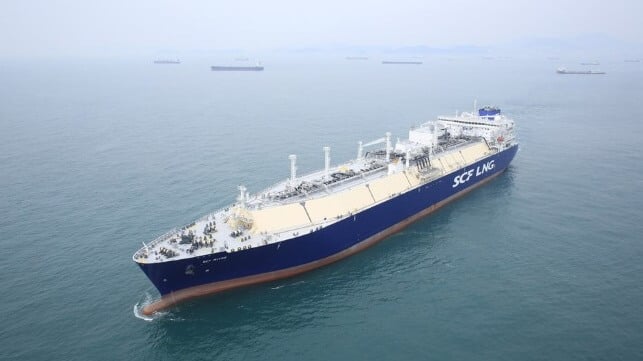Sovcomflot has Worked Around Sanctions to Keep Sailing

Sovcomflot, the Russian state-owned tanker and gas carrier operator, has reportedly found workarounds to address most of the challenges created by the west’s sanctions against Russia. The shipping giant said it is still working and that its fleet remains busy despite the increases in sanctions over the past four months. They, however, remain in technical default on portions of their western debt.
Speaking with reporters at the end of last week, the CEO of the shipping company, Igor Tonkovidov, announced that they had resolved the insurance problems which had threatened to suspend the company’s operations. The increase in banking and financial sanctions by the European Union, the UK, and the United States saw the major insurers such as Guard and Skuld say they were being forced to withdraw their coverage. Major P&I pools have reportedly all ended their coverage and refused new policies for Russian-related assets.
Russian insurers, however, have reportedly stepped in to fill the void with Tonkovidov reporting that Sovcomflot’s fleet meets all international trade requirements, according to a recount of the presentation by Reuters. Sources told Reuters that the state-controlled Russian National Reinsurance Company has become the main reinsurer of Russian ships, including Sovcomflot's fleet.
The western classification societies including DNV, Lloyd’s, and ABS all also announced that they were withdrawing their services from Russia. ABS, for example, issued a statement on March 14, saying, “After careful consideration of the situation in Ukraine and the Black Sea as well as the applicable sanctions, ABS has taken the decision to withdraw all Class services involving Russian vessels, assets, and companies.” ABS reported it was advising clients of the decision while in April DNV reported that it expected to shortly complete the winddown of its services to Russian clients.
Tonkovidov did not address directly how the shipping company has dealt with the withdrawal of the classification societies but media reports have suggested several workarounds. Sovcomflot reportedly was working with an operations management company in Dubai for the fleet. Numerous reports have linked Russian shipping to the Indian Registry of Shipping with a rapid transfer of vessels to IR Class, although the society has denied that it was working with Russian shipping interests.
While Sovcomflot said that its fleet is “almost fully busy,” moving oil products around the globe, the company was earlier forced to idle ships and sell tonnage to address its financial obligation to western banks. A month ago in mid-May, the company confirmed reports saying it had sold 14 vessels achieving its goal to “release a substantial number of vessels from encumbrances.” Observers believed that the sales numbers over 20 ships and pointed out that it included some of the company’s prized LNG carriers and newer ships which were apparently sold by western banks.

that matters most
Get the latest maritime news delivered to your inbox daily.
Last week, Sovcomflot also confirmed that it had been unable to make a second scheduled coupon payment on its Eurobonds. The company in a statement to investors reiterated that it is hindered by the sanctions imposed on the issuer and the guarantor. “Proper discharge of obligations under the notes is currently technically impracticable due to the refusal of the paying agent to accept the payment and pay the coupon to holders of the notes. PAO Sovcomflot is currently considering modifying the terms of the notes by introducing alternative payment arrangements which would allow resuming regular coupon payments in a timely manner.”
The Russians point to examples such as Sovcomflot saying the western sanctions are ineffective while leaders in the west continue to say that they believe they have dealt significant blows to the Russian economy.
